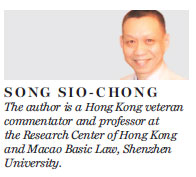The nation will adapt well to new trading environment
Updated: 2015-11-17 07:50
By Song Sio-chong(HK Edition)
|
|||||||
The original US and Japanese design of the Trans-Pacific Partnership (TPP) could have ended up becoming a sharp knife pointed at countries outside the TPP - such as China. When it was concluded early last month after marathon secret talks, it appeared more like a blunt double-edged sword.
Time and tide wait for no man. Within the past five years, China has made great progress in every aspect of development, including expanding its economic reforms and upgrading its industrial and agricultural sectors. The nation is now more prepared than ever for the challenges ahead.
Of the 12 founding members of the TPP, eight have established free trade agreements or other similar arrangements with China. The remaining four TPP members - the US, Japan, Canada and Mexico - so far have no bilateral trade agreements with China but their trade relations with China are very close.
It is likely that trade relations between China and those eight TPP members will likely remain intact unless there are higher preferential arrangements among TPP members.
Amid worries about the TPP targeting the mainland, which has been deliberately excluded from the pact despite being the nation with the largest foreign trade in the world, Hong Kong should take the initiative and help the nation on this issue.
With Beijing's blessing, the SAR - as a separate customs territory of China as stipulated in Article 116 of the Basic Law - should try to join the TPP. This is in order to explore all possible business opportunities arising from it, while promoting Hong Kong as a free port.
Hong Kong could also introduce its own domestic legislation in regard to foreign investment. The mainland can take note of both the TPP rules and Hong Kong's experience regarding foreign investment to update its domestic laws. This is to avoid possible conflicts in the future.
The reason for this is obvious. The TPP provides a dispute resolution mechanism for foreign investment based on TPP rules. It disregards all domestic laws of member countries. Any dispute which arises will be settled by an international tribunal instead of by a domestic court or through arbitration. Domestic laws may no longer be the governing laws for settling such disputes. Therefore, China would have to amend its relevant domestic laws to conform to the requirements of the TPP.
Compared with trade laws, investment laws are more complicated, comprising company laws, tax laws and many others. These may differ from one country to another, and so it takes time for participants to change and adapt.
The TPP's dispute resolution mechanism will protect the interests of foreign investors in TPP members more than those of the countries being invested in. With an emphasis on safeguarding the interests of foreign investors, its impacts on developing and underdeveloped countries are far reaching.
While China is a developing country, it also has the world's largest number of foreign exchange reserves. China placed more emphasis on absorbing foreign investment in the past, but is now gradually boosting overseas investment. It is in China's interests to be better protected by the implementation of the TPP.
The trade relationships between China and the remaining four members of the TPP (the US, Japan, Canada and Mexico) will depend on the relative competitiveness of certain Chinese commodities. This is after factoring in the tariffs among TPP members. For example, the Japanese tariffs on US agricultural products will be gradually reduced to zero within 10 years. US tariffs on Japanese cars will be reduced to nil within 30 years. Theoretically, this means Chinese agricultural products will be less competitive than US products in the Japanese market. It may also mean that Chinese cars may sell at higher prices than Japanese cars in the US.
Nonetheless, even if both the US and Japan completely repeal their subsidies for their manufacturers or farmers, China could still maintain its competitiveness for the following reasons: First, the country can enhance its productivities by reorganization, reformation and technological upgrading. Second, the TPP will not be embraced by US car makers and workers who are worried about jobs being lost and wages being lowered. Out of fear of the US gradually losing many industries, Hillary Clinton, a leading candidate for the Democratic presidential nomination, expressed her disapproval of the controversial TPP deal after it was signed. Similarly, Japanese farmers are likely to disagree with their government for the same reasons.
In other words, the TPP will face domestic opposition among its own members, while encouraging outside competitors to compete more vigorously. And if the competitors become more competitive, the double-edged sword could indeed become a sharp knife - pointing at its own creators. The pact could become a nightmare for some TPP members.
Judging from its experience of more than three decades of reforms and liberalization, I believe China will adapt well to the new trade and investment environment. It will become more competitive in facing future challenges no matter whether it is inside or outside the TPP.

(HK Edition 11/17/2015 page9)